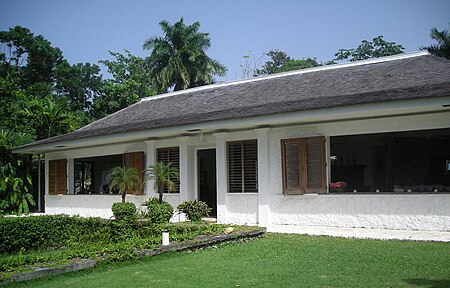Roger Q. Mills
| |||||||||||||||||||||||||||||||||||||||||||||||||||||||||||||||||||
Read other articles:

Goldeneye Goldeneye adalah nama asli dari rumah milik novelis Ian Fleming yang terletak di Teluk Oracabessa di pantai utara Jamaika. Ia membeli 15 ekar (6,1 ha) tanah di sebelah properti Golden Clouds pada tahun 1946 dan membangun rumahnya di tepi tebing dengan pemandangan pantai pribadi. Struktur tersebut memiliki tiga kamar tidur dan dibangun berdasarkan sketsa yang dibuat oleh Fleming, dilengkapi dengan jendela kayu jalousie dan kolam renang.[1] Para pengunjung ke Goldeneye terma…

Istana Mandalayမန္တလေး နန်းတော်Perkarangan Istana MandalayLokasi di MyanmarInformasi umumLokasiMandalayNegara MyanmarMulai dibangun1857Rampung1859 Istana Mandalay (bahasa Burma: မန္တလေး နန်းတော်, pengucapan bahasa Burma: [máɴdəlé náɴdɔ̀]), adalah istana kerajaan terakhir dari monarki terakhir Burma yang terletak di Mandalay, Myanmar. Istana ini dibangun antara tahun 1857 dan 1859 sebagai bagian dari pendirian ibu k…

1745 Battle of the Austrian Succession Not to be confused with Battle of Fontenoy (841). Battle of FontenoyPart of the War of the Austrian SuccessionThe Battle of Fontenoy by Pierre L'EnfantDate11 May 1745 (1745-05-11)LocationFontenoy, Antoing, Austrian Netherlands50°34′10″N 3°28′30″E / 50.5694°N 3.4750°E / 50.5694; 3.4750Result French victoryBelligerents France Great Britain Dutch Republic Hanover Holy Roman Empire…

「伊斯兰国家」重定向至此。關於一种政权形式,請見「伊斯兰国 (政权形式)」。 此條目需要补充更多来源。 (2019年2月22日)请协助補充多方面可靠来源以改善这篇条目,无法查证的内容可能會因為异议提出而被移除。致使用者:请搜索一下条目的标题(来源搜索:穆斯林世界 — 网页、新闻、书籍、学术、图像),以检查网络上是否存在该主题的更多可靠来源(判…

2016年美國總統選舉 ← 2012 2016年11月8日 2020 → 538個選舉人團席位獲勝需270票民意調查投票率55.7%[1][2] ▲ 0.8 % 获提名人 唐納·川普 希拉莉·克林頓 政党 共和黨 民主党 家鄉州 紐約州 紐約州 竞选搭档 迈克·彭斯 蒂姆·凱恩 选举人票 304[3][4][註 1] 227[5] 胜出州/省 30 + 緬-2 20 + DC 民選得票 62,984,828[6] 65,853,514[6] 得…

Santuario della Madonna dei BisognosiFacciata del Santuario della Madonna dei BisognosiStato Italia RegioneAbruzzo LocalitàPereto Coordinate42°02′35″N 13°05′34″E / 42.043056°N 13.092778°E42.043056; 13.092778Coordinate: 42°02′35″N 13°05′34″E / 42.043056°N 13.092778°E42.043056; 13.092778 Religionecattolica TitolareMaria, madre di Gesù OrdineFrati minori cappuccini[1] Diocesi Avezzano Sito webwww.diocesidiavezzano.it/?option=com…

SMP Negeri 1 Ngawen, KlatenInformasiJenisNegeriJumlah kelasKelas VII sampai kelas IXAlamatLokasiJl. Karanganom Mayungan Ngawen Klaten, Klaten, Jawa Tengah, IndonesiaTel./Faks.(0272) 330207Moto SMP Negeri 1 Ngawen, Klaten adalah salah satu Sekolah Menengah Pertama yang berada di Desa Mayungan, Kecamatan Ngawen, Kabupaten Klaten, Jawa Tengah. Sejarah pada awalnya bernama SMP Negeri 1 Ketandan karena berada di Kecamatan Ketandan, Klaten, seiring perubahan nama SMP menjadi SLTP, berubah menjadi…

Artikel ini sebatang kara, artinya tidak ada artikel lain yang memiliki pranala balik ke halaman ini.Bantulah menambah pranala ke artikel ini dari artikel yang berhubungan atau coba peralatan pencari pranala.Tag ini diberikan pada Oktober 2016. Universitas Telekomunikasi Huichon희천 공업 대학JenisUmumDidirikan1959LokasiHuichon, Republik Demokratik Rakyat Korea Universitas Telekomunikasi HuichonJosŏn-gŭl희천 공업 대학 Hanja熙川工業大學 Alih AksaraHuicheon Gongeop DaehakM…

Bambangan kuning Klasifikasi ilmiah Kerajaan: Animalia Filum: Chordata Kelas: Aves Ordo: Pelecaniformes Famili: Ardeidae Genus: Ixobrychus Spesies: Ixobrychus sinensis Bambangan kuning (bahasa Latin = Ixobrychus sinensis) adalah spesies burung dari keluarga Ardeidae, dari genus Ixobrychus. Bambangan kuning merupakan burung pemakan ikan, ketam, kodok, serangga air, yang memiliki habitat di rumpun pandan, buluh di sungai, rawa-rawa, sawah. Ciri-ciri Tubuh berukuran kecil (38 cm). Warna kuning…

Fábio Simplício Informasi pribadiNama lengkap Fábio SimplícioTanggal lahir 23 September 1979 (umur 44)Tempat lahir São Paulo, BrasilPosisi bermain GelandangKarier senior*Tahun Tim Tampil (Gol)2000-2004 São Paulo 2004-2006 Parma 2006-2010 Palermo 2010-2012 Roma 2012-2013 Cerezo Osaka 2014- Vissel Kobe Tim nasional2009 Brasil 1 (0) * Penampilan dan gol di klub senior hanya dihitung dari liga domestik Fábio Simplício (lahir 23 September 1979) adalah pemain sepak bola asal Brasil. Stati…

Amorphophallus konjac Devil's tongue redirects here. For other uses, see Devil's tongue (disambiguation). Not to be confused with cognac or Konyak (disambiguation). KonjacAmorphophallus konjac Scientific classification Kingdom: Plantae Clade: Tracheophytes Clade: Angiosperms Clade: Monocots Order: Alismatales Family: Araceae Genus: Amorphophallus Species: A. konjac Binomial name Amorphophallus konjacK. Koch Synonyms[1] Amorphophallus mairei H.Lév. Amorphophallus nanus H.Li & C.…

French high-speed mail trainset TGV La PosteTGV La Poste trainsetIn service1984- 27 June 2015[1]ManufacturerGEC-AlsthomFamily nameTGVNumber built2+1⁄2 (new) + 1 (converted)Number preserved3 + 1⁄2 spare setFormation10 cars (2 power cars, 8 postal cars)OperatorsSNCF for La PosteSpecificationsTrain length200 m (656 ft 2 in)Width2.904 m (9 ft 6.3 in)Maximum speed270 km/h (168 mph)Power output6,800 kW (9,119 hp) @ 25 kVElectric sys…

Giuseppe Rossi Informasi pribadiNama lengkap Giuseppe RossiTanggal lahir 1 Februari 1987 (umur 37)Tempat lahir Teaneck, New Jersey, Amerika SerikatTinggi 1,73 m (5 ft 8 in)Posisi bermain PenyerangInformasi klubKlub saat ini FiorentinaNomor 25Karier junior2000—2004 Parma2004—2006 Manchester UnitedKarier senior*Tahun Tim Tampil (Gol)2005—2007 Manchester United 5 (1)2006 → Newcastle United (pinjaman) 11 (0)2007 → Parma (pinjaman) 19 (9)2007–2013 Villarreal 136 (54)20…

1787 American organic legislation creating Northwest Territory Northwest Territory (1787) This article is part of a series on theUnited StatesContinental CongressIndependence Hall in Philadelphia Predecessors Albany Congress Stamp Act Congress First Continental Congress Declaration and Resolves Continental Association Petition to the King Second Continental Congress United Colonies Olive Branch Petition Committee of Secret Correspondence Necessity of Taking Up Arms Lee Resolution Declaration of …

List of definitions of terms and jargon used in bowling This glossary relates mainly to terms applicable to ten-pin bowling. For candlepin terms, see Candlepin bowling#Terminology. Contents A B C D E F G H I J K L M N O P Q R S T U V W X Y Z Links to other online glossaries Other sources References An 1892 glossary of bowling terms from a publication of Spalding's Athletic Library[1] The glossary mentions all three balls, in contrast to modern ten-pin bowling in which two ball rolls are …

You can help expand this article with text translated from the corresponding article in Persian. Click [show] for important translation instructions. Machine translation, like DeepL or Google Translate, is a useful starting point for translations, but translators must revise errors as necessary and confirm that the translation is accurate, rather than simply copy-pasting machine-translated text into the English Wikipedia. Do not translate text that appears unreliable or low-quality. If possible,…

National Council of American Indians Insignia Zitkála-Šá, President of the National Council of American Indians The National Council of American Indians (NCAI) was established in February 1926. This organization's purpose was to advocate for Native American rights and representation before the United States government. The National Council of American Indians focused on the Legislative Branch and their Congressional bills. The council's initial concerns included the H.R. 7826; a bill that wou…

Prison religion includes the religious beliefs and practices of prison inmates, usually stemming from or including concepts surrounding their imprisonment and accompanying lifestyle.[1] Prison Ministry is a larger concept, including the support of the spiritual and religious needs of prison guards and staff, whose work in an often demanding and brutal environment often creates a special need for pastoral care, similar to the care that is extended to the military, police officers and fire…

Cary ElwesLahirIvan Simon Cary Elwes26 Oktober 1962 (umur 61)Westminster, London, InggrisPekerjaanAktorpenulisTahun aktif1979–sekarangSuami/istriLisa Marie Kurbikoff (m. 2000)Anak1Orang tuaDominick Elwes (Ayah)Tessa Kennedy (Ibu)KerabatCassian Elwes (saudara Laki-laki) Damian Elwes (saudara Laki-laki)Elliott Kastner (ayah tiri) Ivan Simon Cary Elwes (/ˈɛlwɪs/; lahir 26 September 1962)[1][2] adalah aktor dan penulis Inggris. …

Hospital in Ontario, CanadaMackenzie Richmond Hill HospitalMackenzie HealthWing A of Mackenzie Richmond Hill HospitalGeographyLocationRichmond Hill, York Region, Ontario, CanadaCoordinates43°52′11″N 79°27′00″W / 43.86972°N 79.45000°W / 43.86972; -79.45000OrganizationCare systemPublic Medicare (Canada) (OHIP)TypeGeneralServicesEmergency departmentYesBeds506HistoryFormer name(s)York Central Hospital (1963–2012)Opened1963LinksWebsitehttp://www.mackenziehealth.c…




